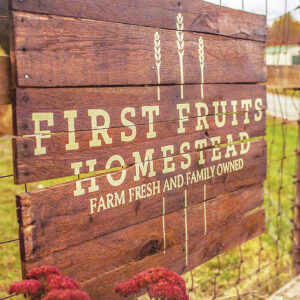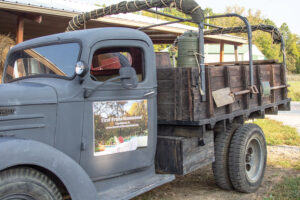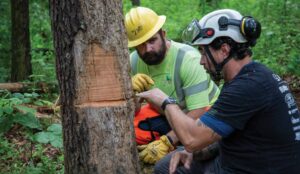In some ways, Coles-Moultrie Electric Cooperative members Owen and Jessica “Jess” Sweitzer resemble the old television show Green Acres. The husband longs to live in the country, but his wife, the city girl, can’t imagine it. Jess was from the Chicago suburbs when she met Owen, who was from rural Illinois. But, this is where the story changes. Once Owen showed Jess the ways of the country, in her words, she was sold!
 “When we bought this particular piece of property, we did not intend to use it for farming,” says Jess. Owen fell in love with the location of the 14 acres and the possibilities. “It wasn’t until five years later that we felt God calling us to start a vegetable farm,” she explains.
“When we bought this particular piece of property, we did not intend to use it for farming,” says Jess. Owen fell in love with the location of the 14 acres and the possibilities. “It wasn’t until five years later that we felt God calling us to start a vegetable farm,” she explains.
In January 2013, Jess, and now former business partner Lauren Callandrilla, decided to start a family garden together on the land and added chickens, pigs and cattle. Neither had a background in agriculture, farming or growing food, but they planned their first garden to help feed their families. They wanted their children to know where their food came from and appreciate the work it took to put it on the table.
“We realized we wanted to do more and offer it to the community and be able to give back,” Jess says. “That’s where the business came from – having that desire to give back to the community and make the produce accessible to food insecure families and individuals. We just jumped in headfirst.”
Jess says she learned vegetable farming takes a lot of hard work and is not a very profitable venture. “We knew it was a seasonal thing with the farmers market, but to be able to pay the bills year-round, we needed something that would bring in revenue November to May.”
The answer was community-supported agriculture (CSA). Through a CSA, subscribers buy a weekly, or bi-weekly, share of the harvest. Community-supported agriculture allows consumers to buy seasonal foods directly from farmers. Shares typically include a box of freshly harvested produce, and some may include other products, such as eggs, meat, flowers or homemade bread.
 In November 2014, the venture officially became First Fruits Homestead. They made plans for the following growing season and hosted their first sign-ups in January.
In November 2014, the venture officially became First Fruits Homestead. They made plans for the following growing season and hosted their first sign-ups in January.
“We literally felt like God was telling us this is what we needed to do,” Jess says. “We tossed around some other crazy ideas of what sustainability might look like for us and how we could give back to the community. This was the model that made the most sense.”
By pre-selling shares, a CSA gave them income up front to purchase seeds, equipment and needed supplies.
“It allowed us to involve another demographic that doesn’t necessarily come to the farmers markets but wants to be more experimental with their food,” Jess explains. “It gave us two things – the financial means during the off season and deeper relationships with those who want to know their farmer. You get to know your customers at the farmers market, but CSA is a different relationship.”
When families come out to pick up their shares, they are encouraged to spend time there to enjoy the farm and let their kids run around.
“It’s more of a farm experience,” Jess says. “They’ve seen pigs being born, taken a hayride and milked a cow. At the farmers market, there is always that financial transaction. Here, it’s 100 percent interaction…The start of the farm was to build community and have a safe place for families to come experience God’s creation and nature.”
 In the spring and fall, they grow a lot of root crops and greens, which then changes to tomatoes, cucumbers, zucchini and okra. Jess enjoys growing a wide variety, including unusual types such as Asian long beans, cotton and flowers.
In the spring and fall, they grow a lot of root crops and greens, which then changes to tomatoes, cucumbers, zucchini and okra. Jess enjoys growing a wide variety, including unusual types such as Asian long beans, cotton and flowers.
The first year of the CSA, there was a great turnout for sign-ups with 25 weekly and 20 bi-weekly shares sold.
Jess says, “We had to feed all these families, and we had never farmed before. It rained almost every day that June, and nothing was growing except weeds. It was very humbling. We thought, what are we going to feed all these people?
“We turned it around with some new equipment,” she explains. “We couldn’t handle all the weeds. We built up the rows and covered them with plastic. Our first year, we just didn’t know the ground very well and where the drainage issues would be.”
The biggest challenges have been bugs and weather. It is guaranteed they will battle insects every year and the weather will be unpredictable. While those elements may change, Jess knows she can count on the cucumber beetles being out in June, and once broccoli is in the ground, she will battle cabbage worms and moths.
“That’s been a challenge,” Jess says. “We do grow organically. We are not certified organic, but we follow those practices. We lose most things from bugs.”
 The goal of the farm has always been to give back. The original goal was 10 percent at a minimum—last year the total came to 25 percent. Local food pantries and those in need benefited from total donations of 2,500 pounds of food. “When you think in terms of lettuce, that’s a lot,” Jess explains. “It’s not all watermelon… a lot of it is lighter weight things.”
The goal of the farm has always been to give back. The original goal was 10 percent at a minimum—last year the total came to 25 percent. Local food pantries and those in need benefited from total donations of 2,500 pounds of food. “When you think in terms of lettuce, that’s a lot,” Jess explains. “It’s not all watermelon… a lot of it is lighter weight things.”
She adds, “A lot of the individuals that go to food pantries want ready-to-eat meals and may not have the means to do food prep or cooking. They want vegetables they are familiar with and are ready to eat. Tomatoes and cucumbers are always a good thing. The past four years has shown what people will use. The majority don’t want mustard greens or Asian beans; they want the basics they know how to use.”
With Lauren stepping away from the business after the 2018 season, Jess and Owen will scale back their vegetable acreage from five to two acres and utilize the other acres for rotational grazing for their cattle. They plan to continue offering their 14-week CSA but will only sell 16 bi-weekly shares.
 “With the transition of the farm, Owen and I felt it was important to have high quality produce baskets rather than quantity,” Jess explains. “We will continue to participate in the 18th Street Farmers Market in Charleston on Saturday mornings. We have developed many close relationships and want to continue to provide our community with access to locally-grown, farm-fresh produce.”
“With the transition of the farm, Owen and I felt it was important to have high quality produce baskets rather than quantity,” Jess explains. “We will continue to participate in the 18th Street Farmers Market in Charleston on Saturday mornings. We have developed many close relationships and want to continue to provide our community with access to locally-grown, farm-fresh produce.”
In November and December, Jess pored over seed catalogs and put together her planting spreadsheet. Thanks to a $10,000 grant last year from Faith in Place, she now has a seed house that allows her to start seeds in January.
It appears that for Jess those green acres are the place to be and farm living is her life. The city girl has truly been transformed by the countryside.










